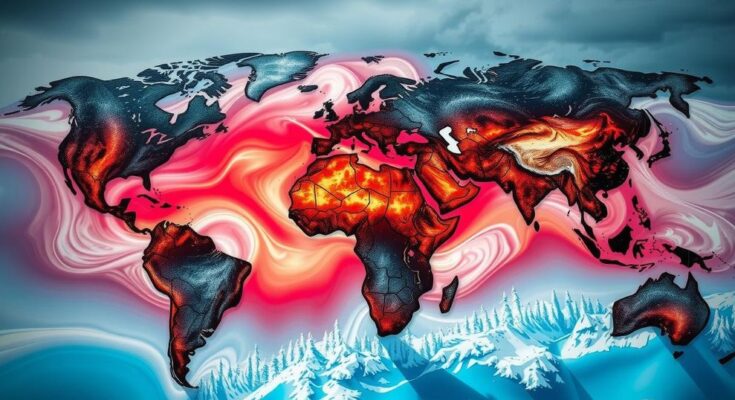In 2024, climate change impacts intensified globally, becoming the warmest year on record. The UN and WMO emphasized the urgent need for action to address rising greenhouse gas levels and extreme weather events that have devastated communities worldwide. Initiatives focusing on climate adaptation and the cryosphere are set for 2025 to combat these ongoing challenges.
The year 2024 marked a critical juncture for global climate, as various impacts intensified across lands and waters. According to the World Meteorological Organisation (WMO), 2024 is anticipated to be the hottest year recorded, concluding a decade notorious for extreme heat driven by augmenting human activity. Greenhouse gas concentrations have surged to unprecedented levels, ensuring further temperature increases in the coming years.
In his New Year address, United Nations Secretary-General António Guterres emphasized that the last ten years represent a period of severe climatic distress, stating, “The top ten hottest years on record have happened in the last ten years, including 2024.” He underlined the urgent need for immediate action to mitigate emissions and facilitate a transition to renewable energy.
WMO Secretary-General Celeste Saulo reiterated the ongoing climate crisis, designating 2024 as a year marked by catastrophic weather phenomena. Record rainfall, devastating floods, and intense tropical cyclones caused significant loss of life and immense economic consequences across multiple continents. The alarming rise in average temperatures has led to extreme heat conditions, with several regions enduring temperatures exceeding 50 °C, and extensive wildfires have ravaged many areas.
As WMO prepares to commemorate its 75th anniversary, it emphasizes the necessity for joint global responsibility to address these pressing challenges. The organization is advancing initiatives such as the Early Warnings for All project to enhance climate resilience and the Global Greenhouse Gas Watch to bolster climate mitigation efforts.
Looking ahead to 2025, a dedicated focus on the cryosphere—the Earth’s frozen components—is anticipated as part of the International Year of Glaciers’ Preservation, organized by UNESCO and WMO. This initiative aims to address and protect vital ice reserves crucial for regulating global climate patterns.
The article addresses the escalating impacts of climate change as reported by the World Meteorological Organisation (WMO) at the onset of 2025. It highlights the ongoing record-breaking temperatures over the last decade due to human-induced greenhouse gas emissions. The significant rise in extreme weather events serves as compelling evidence of a rapidly changing climate, necessitating immediate global action to mitigate its causes. The emphasis on community, economic, and environmental effects underscores the widespread repercussions of climate change, emphasizing the necessity for a collective response to ensure a sustainable future.
In summary, the climate events of 2024 illustrate the dire state of the environment, with extreme temperatures, flooding, and wildfires intensifying worldwide. Both the WMO and UN officials call for urgent and drastic measures to combat climate change, emphasizing the urgency of reducing emissions and enhancing adaptation strategies. The upcoming initiatives in 2025 regarding the cryosphere reflect a commitment to addressing these issues and safeguarding our planet’s future.
Original Source: www.wam.ae




